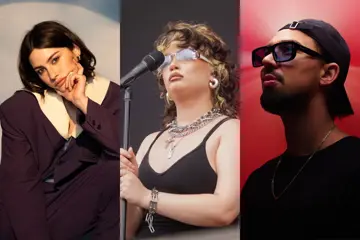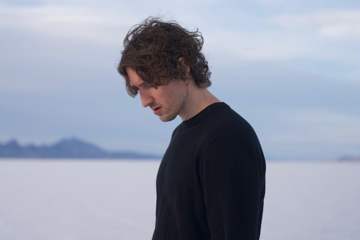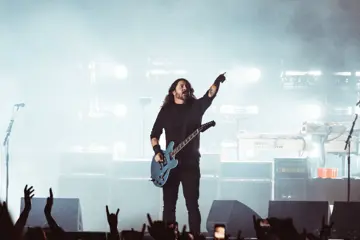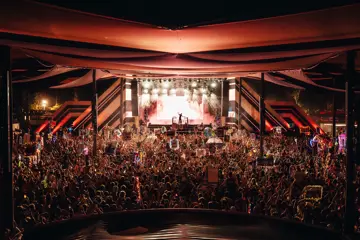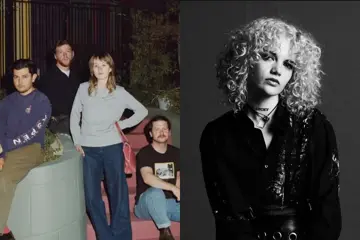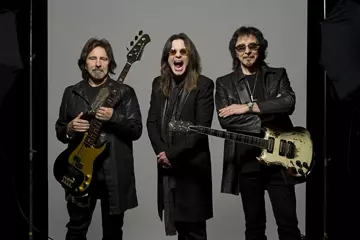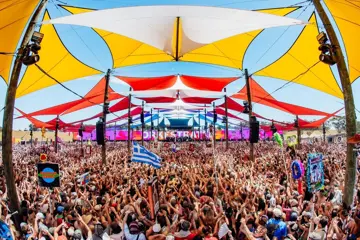It's actually somewhat astonishing that Jungle Love Music & Arts Festival is only in its fourth year in 2017. Such has been its impact on the local boutique festival scene that, with each instalment, it's continued to grow at a remarkable rate as word has spread further and further from its creative home in Brisbane to attract punters from Sydney, Melbourne and other interstate destinations.
The brainchild of directors Lincoln Savage and Raymond Williams — who first met as like-minded stagers of house, and then warehouse, parties in the city's fertile DIY scene — Jungle Love is a unique prospect on the annual event calendar, boasting a Queensland-heavy line-up of emerging, exciting music, coupled with an impossibly idyllic site (the serene Borumba Deer Park, in nearby Imbil), a dyed-in-the-wool community ethos and adherence to inclusivity and sustainability.
With this year's event expected to once again hit capacity, the festival has come a seemingly unfathomably long way from its first, 600-person iteration at Lake Moogerah, which was borne both of Williams' lifetime dream of staging a festival, and outright necessity, when one of his warehouse parties was shut down over noise complaints.
"I was like, 'Alright, fuck this; let's go out to a field," he laughs. "'More people, no one to complain, let that be that.' And we just wanted to be able to do more, to bring more people together.
Don't miss a beat with our FREE daily newsletter
"There was, from what we were seeing at our shows, a want for people to have these kinds of events, not just about seeing necessarily the biggest band, but stuff that's in the underground scene that was undeniably really, really good, regardless of if thousands of people were following it, or only a couple hundred at that time. So we wanted to be able to pair those bands with the crowd that would love them. I guess we tried to bring together people that love music objectively rather than happen to follow whatever everyone else is saying."
Indeed, Jungle Love's line-ups are renowned as some of the most eclectic and exciting groupings of artists you're likely to see anywhere in the country. This year's event will host everyone from Harts and Baskervillain to the likes of Fight Ibis, Pink Matter, the reforming LeSuits, The Mouldy Lovers and heaps more; with the exception of Harts, you wouldn't necessarily say those acts are high-profile in the classic sense, but this desire to champion lesser-known local greatness also stems from the festival's communal core.
"The viability of running a festival — so, booking acts and having multiple acts and having multiple stages outdoors — is very, very expensive, so the business models generally call for booking triple j acts, having big numbers, and it's quite difficult to start small," Savage explains. "But what the problem is there is you have so much amazing emerging music — in any city, particularly in Brisbane — that doesn't really have anywhere to play apart from the local venues, and then they don't get a very big crowd, but the idea of bringing together so many of these bands is that there are so many local bands that are absolutely amazing performances, and you get a bit of centrifugal force.
"So it's like a snowball; you put them all together and then you get more people, and then you get much more cross-pollination. So the audience will see all of these other bands they would never usually see, and I think that's at the heart of building a strong, supportive music scene, in the relationship between the performer and the audience."
"I think it means that we have a longer, overall slower growth, but I'd say a more sustainable growth," Williams adds. "So, there's challenges in that way, but in other ways, we have a lot of freedom; we're not bound to pick similar playlists to other festivals. We can pick an obscure band that maybe people haven't heard of from anywhere in the country, or maybe it's somewhere else in the world, and then put them on at primetime in the evening, and that sort of has its own result; it generally comes with an element of surprise for people and they love the experience so much that they come back."
By its second year, Jungle Love had found what has since become its home in Borumba Deer Park. The first venue Williams approached to hold the festival, they were able to convince the owner of its merits following that first successful outing, despite his original reservations. His faith was well-founded; according to Savage, going into year four, Jungle Love has "never had a QPS callout".
"We've never had to call the police, never done Triple 0, never had an ambulance service callout either, in three years of running a festival, which is now surpassing 2,000 attendees," he says, explaining that the reasons for their lack of incidents is "absolutely cultural".
"It's because we started small from building our grassroots networks and communities of music lovers and people who just like to get together," he offers. "From house parties to warehouse shows to a 600-person festival up until now. And it's almost like these social groups grow, and they handpick people to bring each year, and that's where the growth comes from.
"Since day one, we've been very conscious of that, and the delicate nature of ensuring that people feel safe and comfortable in that environment, both physically but also in themselves. They feel free to express themselves and be themselves, and that's at the core of what we're doing. So yes, it's a music festival, but it's in our hearts for what it is.
"With every decision we make, we consider these things; programming is one good example," he adds. "We book a lot of varied acts, but some acts we don't book because they sometimes attract young male crowd who drink too much and get aggressive or get over the top. But, in some ways, some of these people do attend, and they actually get cooled down by the crowd, by the environment; it actually makes people that might misbehave in some places, they don't misbehave in this space because they kind of respect it."
As the event's renown grows — far from having to seek out every act to fill their line-up, this year the festival saw over 400 applications from artists wanting to be a part of the event — so too does audience interest. While the directors still retain a keen interest in who plays the festival, they've increasingly cast a wider net, relying on their blossoming team of staff and volunteers to help flavour the festival their own way, trusting in the community's shared love of music of all stripes.
"I guess we feel that our audience sees things similar to us," Williams says. "We try and attract people kind of like us. But there's definitely a handful of acts that are, like, maybe this isn't our cup of tea, but we can see that it's quality and we can see there will be people in our audience that really get into it. And there are some genres that I'm personally not big into, but I know, in a music-loving crowd, there are going to be people who are into those different things. So we definitely still — we can be convinced, if someone says, 'No, trust me, get this act, they'll go down well,' we'll definitely give it thought. We've done it a lot of times and even we've been surprised."
Those aren't the only unexpected moments they've experienced over the years; the process of staging and growing Jungle Love, year on year, has been a learning experience on multiple fronts, taking place against a backdrop of other boutique festivals around the country, who, Savage is happy to admit, "we admire… a lot", and who inspire and teach them too. And, while the festival shows no signs of slowing down, he and Williams are dedicated to ensuring, no matter how big Jungle Love gets, it never loses sight of its musical-discovery-driven, community-minded vision.
"For both of us, it's the biggest project we've both done, and everyday we learn more," Savage admits. "It's getting to a scale now where, you know, we wouldn't have been able to handle this back in the day; it would've been too much for us. But now we've built these skills up to do it.
"It's a simple core: inclusivity, supporting emerging, amazing music, bringing people together and having a good time… There wasn't anything like what we're doing now back then. There are some great festivals, like Red Deer and some smaller ones that are starting out as well, but the more opportunities, the better. There's a lot of bands in Brisbane, a lot of amazing music here. The more opportunities there is for them to play, fuckin' great!"
"As time goes on, naturally things do evolve, and I think in the future we want to see Jungle Love having an even bigger role to play in the wider community," Williams concurs. "So… not just to bring people together for a party, but so they can make connections, be inspired to do good things in the world and in their lives afterwards.
"But already we're now realising, actually, we need to focus a lot more on sustainability, so we're working towards creating a completely sustainable festival. This year, we've got huge new improvements with our recycling campaign, composting, overall 'leave no trace' policy. In the future, we want to see more environmental initiatives come as a result of holding Jungle Love and ultimately have a positive impact on the environment from the event taking place. I mean, these are just grand ideas, but I'd love to see, long-term, Jungle Love supporting artists in other ways, like I just have this idea of having a yearly grant that we can offer musicians to record and produce an album and go on a tour, one day… but all those things tie in with the initial reasons we started it out in the first place: to have a positive impact in the local community and in the world."


